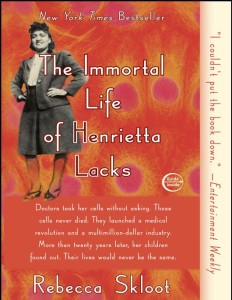I won’t hesitate a bit to say that The Immortal Life of Henrietta Lacks is one of the best narrative nonfiction books I have ever read.
The Immortal Life of Henrietta lacks
Author: Rebecca Skloot
Paperback: 381 pages
Publisher: Broadway Books (March 8, 2011)
ISBN-10: 1400052181
You may not know this but Henrietta Lacks touched you the moment you had your first vaccine. The Immortal Life of Henrietta Lacks is a story of the woman who gave medical science the ability to test thousands of cures and continues to do so. HeLa cells, named after Henrietta Lacks, have been used since the 1950’s across the world in science laboratories to test chemicals, viruses, bacteria and everything else to simulate how human cells will react. HeLa is everywhere and has been to moon too. The story of HeLa cells is amazing, but so is the story of the woman who gave desperate scientists the first human cells that keep on duplicating and living out of the human body.

Of Course, this wonderful news for medical science was not wonderful for Henrietta. You can imagine her agony when you think of the cancerous cells that keep on duplicating every 24 hours. The aggressive cancer invaded Henrietta’s body in eight months.
Rebecca Skloot, the author of The Immortal Life of Henrietta Lacks, couldn’t help thinking about Henrietta since her first biology class in high school, when she first heard of the HeLa cells. The author narrates the amazing story with exhaustive research from newspaper cuttings, a reluctant family, and people who grew up with Henrietta and painted a picture of selfless soul who helped everyone she touched, and continues to do so.
Another important point that the book makes is about medical ethics. The HeLa cells came from a biopsy of Henrietta’s cervix when she first went to John Hopkins, without asking her permission to culture them or use them in research. The author raises similar ethical issues throughout the book as she alternates between the past and the present. However, the timeless is clearly marked and does not confuse the reader in any way. The author’s fluid narration makes it easy to understand difficult medical terms and concepts as she explains them in plain language.
The book might seem too graphic to readers who do not particularly like to read medical texts and avoid reading about human anatomy and diseases. However, the book is much more than a scientific text as the author talks about Henrietta lacks and her immediate family and the emotions that they experienced during the ordeal and later when they came to know of the cells some 20 years after her death. This is one book you should not miss.
Interview with Rebecca Skloot
Rebecca Skloot is an award winning science writer and published in The New York Times Magazine, Discover, Prevention, and others.
